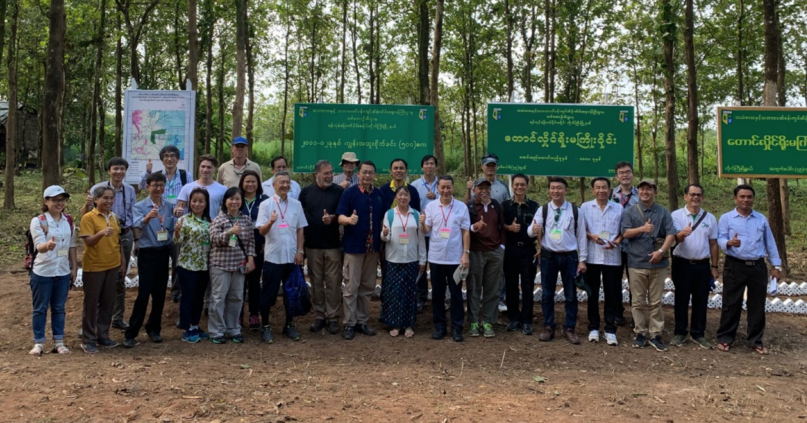Workshop explores contributions of Mekong teak forests to SDGs
2 October 2019, Yangon, Myanmar

Participants in the Regional Workshop on Sustaining Teak Forests in the Mekong Basin visit a 7-year-old commercial teak plantation at Hmawbi, Myanmar. Photo: ITTO
The Regional Workshop on Sustaining Teak Forests in the Mekong Basin, which was convened by ITTO in cooperation with the Asian Forest Cooperation Organization (AFoCO) and the Forest Department of Myanmar, made six key recommendations for the sustainable development of the teak forest sector.
Speaking at the opening of the workshop, Dr Ye Myint Swe, Deputy Minister of Myanmar’s Ministry of Natural Resources and Environmental Conservation, said sustaining teak forests is extremely important to Myanmar, and his government is committed to sustainable teak forest management and addressing climate change, deforestation and biodiversity loss. He said he appreciated ITTO’s support for teak-related projects on genetic resource conservation and the sustainable management of natural and planted teak forests.
ITTO Projects Manager Dr Hwan-Ok Ma said there is an increasing need to generate income for smallholders and create job opportunities for young people in the teak forest sector, given the increase in the number of people aged 15 to 24 in the Mekong Basin. “The establishment of innovative incentive mechanisms to promote legal and sustainable supply chains of teak timber and teak products is critical to the sustainability of the teak sector,” said Dr Ma. He noted that a forthcoming ITTO study on incentive mechanisms in the Mekong subregion will provide important information for ensuring the legality and sustainability of domestic and international trade.
AfoCO’s Mr Sung Ho Choi said that community forestry and the maintenance of forest ecosystems are priorities in AFoCO’s member countries. He looked forward to more partnerships between ITTO and AFoCO in promoting community-based forest management.
Other speakers at the opening of the workshop were Dr Nikhom Leamsak, Dean of the Faculty of Forestry, Kasetsart University, Thailand, and Dr Chanhsamone Phongoudome, Deputy Director General of the Laotian Agriculture and Forestry Research Institute.
Workshop participants agreed that the sustainable development of the teak-based forest sector requires:
- Enhancing the in-situ and ex-situ conservation of teak genetic resources through the establishment of seed production areas and seed orchards. There is also a need for long-term teak improvement research and development programmes to supply high-quality seed for teak plantations and joint research on the conservation of teak genetic resources linked with breeding and biotechnology. This includes the transfer of seeds for plantations and genetical materials subject to national regulations in the Mekong subregion to improve the genetic base of populations and avoid genetic erosion.
- Improving silvicultural aspects of teak plantations, from the selection of suitable sites to thinning and harvesting techniques. There is a strong need to share knowledge and experiences in the sustainable management of teak plantations.
- Promoting the engagement of smallholders and communities, including young people and women, in natural teak forest management and the establishment of planted teak by supporting the supply of high-quality teak seedlings and extension services to smallholders and encouraging capacity building, networking and partnerships.
- Promoting value chains for teak timber and timber products through value-added product development, appropriate incentive mechanisms for smallholder plantations, improved marketing and greater access to finance and long-term investment, and by conducting a global study on teak supply and demand and sustainable teak industry development to ensure effective policies and law enforcement and increase intraregional teak trade.
- Strengthening the sustainable supply and consumption of teak timber and timber products through the establishment of incentive mechanisms to promote legal and sustainable teak supply chains and by increasing regional cooperation aimed at growing investment in downstream supply chains, improving marketing and increasing the teak trade.
- Encouraging the formulation of sustainable global teak strategies and recommended actions at the Fourth Global Teak Conference to be held in Accra, Ghana, in August 2020 and scaling up international cooperation, partnerships and networking to promote the contributions of sustainable teak forests and teak products in addressing climate change and the Sustainable Development Goals, especially SDG 15 “Life on land”, SDG 12 “Sustainable supply and consumption”, and SDG 8 “Decent work and economic growth”.